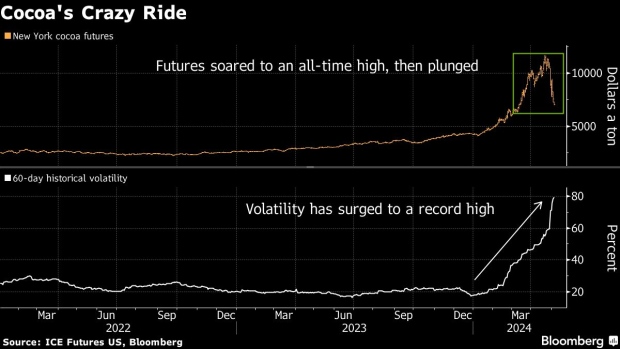Cocoa whipsaws to close one of the wildest weeks market has seen
Cocoa futures whipsawed, while still on track for a nearly 30% weekly drop, as it wraps up one of the craziest stretches the market has ever seen.
Just two weeks ago, the most-active contract hit a record of almost $12,000 a ton as the industry grappled with the fallout of severe supply shortages. But a plunge this week took futures as low as $6,990 — roughly 40% below the all-time high — accompanied by extreme price swings after an exodus of traders sapped liquidity.
The pullback has marked a stark turnaround for cocoa, which had become more expensive than copper. Prices soared as poor harvests in West Africa left the world facing a third year of shortages, stressing buyers and making chocolate pricier. But the wild run has also made it costlier for traders to maintain their positions, prompting many to walk away.
The cash crunch is hitting the physical market by forcing traders to delay purchases from the top producers, Bloomberg reported this week. Buying more beans would require them to hedge their purchases in the futures market, just as bigger volatility means they need to put up more cash to cover margin calls.
“It’s important to underscore that the recent downturn in cocoa prices is primarily a result of trading maneuvers, not a realignment of market fundamentals,” analysts at Fitch Solutions’ BMI unit said in a note, adding they expect volatility to persist.
Cocoa slid as much as 7.6% to $6,990 a metric ton in New York on Friday, before paring losses to trade 0.9% higher. It’s still on track for a 28% weekly drop, the largest in data to 1959.
Recent rain that could aid crops in West Africa may be weighing on prices. Still, more is needed to fully ease dryness in the region, according to forecaster Maxar Technologies Inc.
Ivory Coast and Ghana have also raised the prices paid to farmers, which could entice more beans back to the market.
Unprecedented Volatility
Volatility spiked as bigger margin requirements spurred traders to close out positions, helping to drive aggregate open interest, or the number of outstanding contracts, in New York cocoa to the lowest in more than a decade. That has left the market more vulnerable to huge price swings like those seen this week.
In other soft commodities, robusta coffee futures in London fell on Friday to the lowest in a month, with signs of rising stockpiles easing supply concerns.








